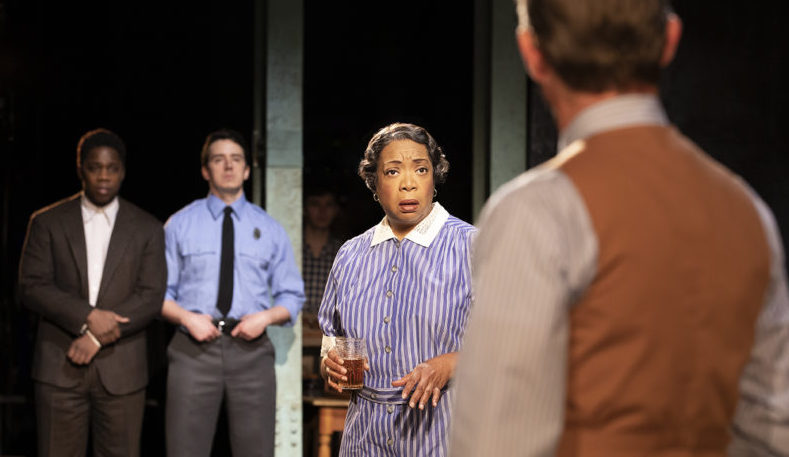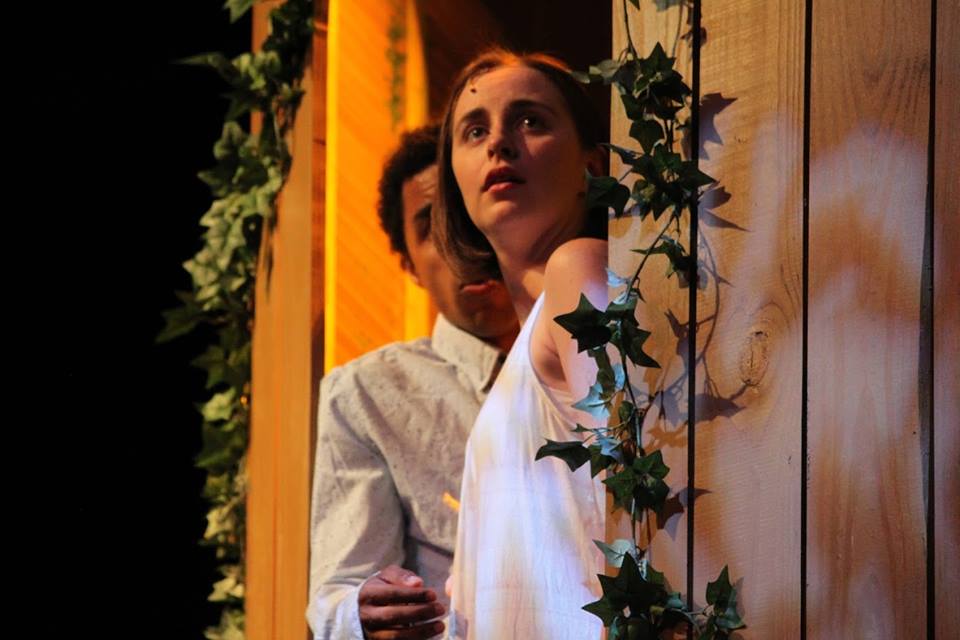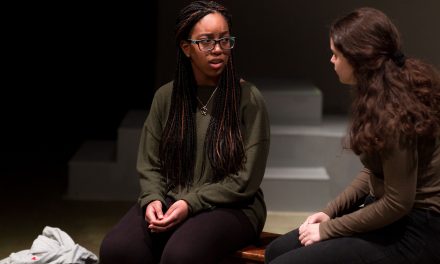Yaegel T. Welch, Jacqueline Williams, & Richard Thomas To Kill A Mockingbird. Photo: Julieta Cervantes
To Kill A Mockingbird
A new play by Aaron Sorkin
Based on the novel by Harper Lee
Directed by Bartlett Sher
A review by Keith Waits
Entire contents are copyright © 2023 by Keith Waits. All rights reserved.
I have observed that the best productions of classic stories make me lose sight of my familiarity with the material. When Goody Proctor is asked the question that could remove the suspicion surrounding her husband in The Crucible, a great production makes me want her to answer differently than Arthur Miller has insisted since 1953. It is, of course, impossible, but the challenge is to take the audience to that place where anything is possible.
I venerate Harper Lee’s To Kill A Mockingbird as much as anyone, both the Pulitzer Prize-winning book and the classic 1962 film for which Gregory Peck won the Academy Award for Best Actor, and I admire Aaron Sorkin’s writing, so this new adaptation held great promise.
The familiarity of the story is its own attraction, a compelling legal drama and coming-of-age narrative that illustrates the endemic racism of American culture and the legal system in particular. Atticus Finch’s defense of Tom Robinson (Yaegel T. Welch), a Black man accused of raping a White woman, is presented as a high-minded ideal that instead of the norm, is an ideal undermined by the lowest common denominator of his own community. We are comforted by Atticus’ stand (heroic in the novel and film but more equivocal here) because it allows us to occupy the shoes of the righteous underdog.
Sorkin plays with that familiarity right off the bat, with an opening scene introducing Atticus’ children Jem (Justin Mark) and Scout (Melanie Moore), and their friend Dill (Steven Lee Johnson) directly referencing the story’s violent climax, and builds a non-linear structure that prevents easy association with our previous experience with Mockingbird.
He also culls parts of the novel left behind in other adaptations, such as Jem’s conflict with Mrs. Henry DuBose (Mary Badham, who 60 years ago played Scout in the movie) and he builds a much more fully realized character for Calpurnia (Jacqueline Williams), who works for Atticus as a cook, housekeeper, and surrogate mother for Jem and Scout. She questions Atticus in a manner that seems less than authentic for a Black maid in small-town Alabama in 1934 but speaks volumes to today’s audience. One particular exchange created entirely by Sorkin finds the essential motivation behind all of the choices he made in adapting this story.
Tom is accused of raping and beating Mayella Ewell (Arianna Gayle Stucki) but that the real culprit is her father, Bob (Joey Collins) is another story point that comes as no surprise. Even if you have never encountered Mockingbird before, the performance of the character is so overwrought and his dialogue so riddled with contemporary Right Wing broadsides that his villiany is unmistakable. It feels like the one clear misstep in the play. The relationship to modern day issues may be Sorkin’s reason for taking on this material at this time, but the resonance is inherent in Harper Lee’s narrative without the heavy handedness.
Growing up with this story, I always saw Tom Robinson’s’ tragedy as unfortunate but I believed in Atticus Finch when he fails to understand Tom’s decision to take flight. His faith in the system and the plans for an appeal can seem naive in the light of the heightened awareness of systemic racism in the justice system. But now I understand that Atticus’ idealism is a privilege the White lawyer can afford and the Black field hand cannot. Once accused of raping a White woman, Robinson is doomed. No matter what any Alabama jury decides, he has no future. In the climactic moment of his testimony, Tom speaks an important truth, even though it seals his fate.
Perhaps Sorkin’s most significant accomplishment here is forcing this new perspective on To Kill A Mockingbird by challenging our relationship to and understanding of Atticus. The character typically ranks as one of the great American heroes, a pillar of rectitude, but Sorkin deconstructs the character and rebuilds him as flawed but compassionate, and gives him moments of anger and hostility that only underscores how hard he works to provide an example to his kids and his community, and how his community disappoints him in the end.
Richard Thomas’ image seems to position him well for the idealized Atticus, but I think he is even more suited to Sorkin’s reconception, and he delivers a forceful yet nuanced performance. He leads a strong cast and solid ensemble. Yaegel T. Welch is an emotional, almost child-like Tom Robinson. Trusting that knowing his place would keep him safe, he is the most assuredly 1934 of the main characters. Calpurnia means so much to the play and Jacqueline Williams plays her flawlessly, giving snap to Sorkin’s contemporary dialogue.
The three kids are beautifully realized in performances that easily overcome the differential of the actors being 15 years older, full of humor, daring, and dedication to the family, and Melanie Moore occupies Scout and the beating heart of the play with real authority. Arianna Gayle Stucki’s Mayella is a beautifully-observed study of an abused woman so trapped in the fear and shame of her circumstance that she is incapable of seizing escape when it is offered. She here remains entirely Harper Lee’s creation, as much of a case study in the gifts of this writer as Atticus, Jem, or Scout, for Mayella walks among us still. I also very much liked David Christopher Wells’ work as Sheriff Heck Tate. He delivers the iconic line, “I’m STILL Sheriff of Maycomb County, Mr. Finch,” with exactly the authority it needs to be the final word on the matter. Travis Johns is spectral and haunting as Boo Bradley, but the less said about that character the better. Jeff Still and Greg Wood were other stand-outs in this fine ensemble.
The show was designed by Miriam Buether, with costumes by Ann Roth, lighting by Jennifer Tipton, sound by Scott Lehrer and an original score by Adam Guettel. All of the design work was evocative and set changes were effectively handled so that the 3-hour with an intermission run time flowed at a good pace.
To say that this To Kill A Mockingbird is as much Aaron Sorkin’s as Harper Lee’s would be an overstatement, but it is without question the boldest adaptation of the novel and the time seems right. I doubt anyone would claim that the novel is in need of reinvigoration, yet this new text will almost certainly replace all other stage adaptations moving forward. The book doesn’t need Sorkin’s current affairs point-of-view to speak to the times we live in, the fact that it can stand up to this sort of interpretation and even gain from it just proves how indelible it is, but his version will dominate and uplift the iconic work for generations to come.
And to return to my beginning point, does Sorkin deliver that surprise that overcomes familiarity. Yes. In that crucial exchange between Calpurnia and Atticus, and something muttered beneath the breath.
Featuring Richard Thomas, Melanie Moore, Jacqueline Williams, Justin Mark, Yaegel T. Welch, Steven Lee Johnson, Mary Badham, Joey Collins, David Manis, Luke Smith, Arianna Gayle Stucki, David Christopher Wells, Jeff Still, Liv Rooth, Travis Johns, Morgan Bernhard, Denise Cormier, Christopher R Ellis, Stephen Elrod, Glenn Fleary, Maeve Moynihan, Daniel Neale, Dorcas Sowunmi and Greg Wood.
To Kill A Mockingbird
June 20 – 25, 2023
Broadway in Louisville
The Kentucky Center
501 West Main Street
Louisville, KY 40202
Keith Waits is a native of Louisville who works at Louisville Visual Art during the days, including being the host of Artists Talk with LVA on WXOX 97.1 FM / ARTxFM.com, but spends most of his evenings indulging his taste for theatre, music and visual arts. His work has appeared in Pure Uncut Candy, TheatreLouisville, and Louisville Mojo. He is now Managing Editor for Arts-Louisville.com.





